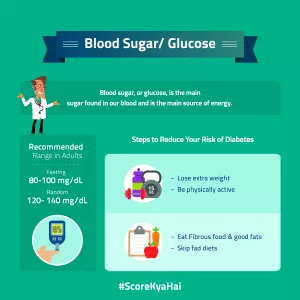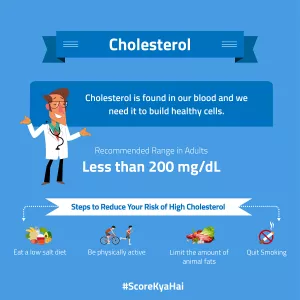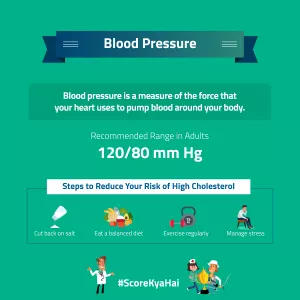Know Your Vitals
Keep a track on your health score.
We take all the necessary steps to ensure our complete wellbeing but, we can never be too sure, and chronic & life-threatening diseases may come knocking anytime. The initial warning signs of many diseases can be so mild that you don't notice them until the disease has caused long-term damage.
A well-designed, Preventive Health Checkup at Aster Hospitals, will track all your vital parameters and help you identify the risk factors at an early stage, to help you effectively manage and avoid any term effects.
So, don’t wait and book your preventive health check-up at Aster Hospitals today!
Want to know more about important health parameters? What is the recommended range? Lifestyle modifications you can make to correct your vitals. The answer to these questions and many can be found below.
Type 1 diabetes
Type 1 diabetes accounts for about 5% of all diagnosed cases of diabetes. Type 1 is usually diagnosed in children and young adults, although it can occur at any time. People with type 1 diabetes must use insulin from an injection or a pump to manage their diabetes.
Type 2 diabetes
Type 2 diabetes accounts for about 95% of all cases diagnosed in adults. Several studies have shown that healthy eating, regular physical activity, and weight loss used with medication if prescribed, can help control complications from type 2 diabetes or can prevent or delay the onset of type 2 diabetes.
Gestational diabetes
Gestational diabetes is diagnosed in 2 to 10% of pregnant women. Gestational diabetes can cause health problems during pregnancy for both the child and mother. Children whose mothers had gestational diabetes have an increased risk of developing obesity and type 2 diabetes. Although gestational diabetes often goes away after pregnancy, about half of all women who have gestational diabetes get type 2 diabetes later in life.
Urine analysis
A urine analysis may show high blood sugar. But a urine test alone does not diagnose diabetes. Your health care provider may suspect that you have diabetes if your blood sugar level is higher than 200 mg/dL. To confirm the diagnosis, one or more of the following tests must be done.
Blood tests
Fasting blood glucose test, hemoglobin A1c test, and oral glucose tolerance test are blood test that can be done to diagnose diabetes.
Screening
Screening for type 2 diabetes in people who have no symptoms is recommended for: overweight children who have other risk factors for diabetes (starting at age 10), overweight adults (BMI greater than 25) who have other risk factors, and adults over age 45.
While the cause of high blood pressure in most people remains unclear, inactivity, poor diet, obesity, older age, and genetics -- can all contribute to the development of hypertension.
The Joint National Committee on Prevention, Detection, Evaluation, and Treatment of High Blood Pressure has classified blood pressure measurements into several categories:
- Normal blood pressure is systolic pressure less than 120 and diastolic pressure less than 80.
- Elevated is a systolic pressure of 120-129 and diastolic pressure less than 80.
- Stage 1 hypertension is a systolic pressure of 130-139 or a diastolic pressure of 80-89.
Stage 2 hypertension is a systolic pressure of 140 or greater or a diastolic pressure of 90 or greater.
High blood pressure often doesn't have any symptoms, so you usually don't feel it. For that reason, hypertension is usually diagnosed by a health care professional during a routine checkup. If you have a close relative with hypertension, or other risk factors, it is especially important to pay attention to your blood pressure reading.
In order to diagnose high blood pressure, your doctor will check your blood pressure with a blood pressure cuff. It's important to pay attention to both the higher (systolic) and the lower (diastolic) numbers in your blood pressure readings.
If your blood pressure is extremely high, you may have unusually strong headaches, chest pain, difficulty breathing, or poor exercise tolerance. If you have any of these symptoms, seek an evaluation promptly.
As is true with any medication, high blood pressure drugs have side effects. Among the most common are the following:
- Diuretics: headache, weakness, low potassium blood levels
- ACE inhibitors: dry and persistent cough, headache, diarrhea, high potassium blood levels
- Angiotensin receptor blockers: fatigue, dizziness or fainting, diarrhea, congestion, high potassium blood levels
- Calcium channel blockers: dizziness, heart rhythm problems, ankle swelling, constipation
- Beta-blockers: dizziness or lightheadedness, decreased sexual ability, drowsiness, fatigue, low heart rate
- Alpha-blockers: dizziness, headache, pounding heartbeat, nausea, weakness, weight gain
If you are diagnosed with high blood pressure, it's important to see your doctor on a regular basis. They can answer your questions during these visits.
However, there may be other times when you may need to speak to your doctor. For instance:
If you aren't responding to the prescribed treatment and your blood pressure is still high
If you are having any side effects from the blood pressure medication; if this happens, your doctor may wish to adjust the dosage of the medication or put you on another medication.
Cholesterol is a waxy, fat-like substance that occurs naturally in the body and is made by the liver. Cholesterol is also present in foods we eat. People need cholesterol for the body to function normally. Cholesterol is present in membranes (walls) of every cell in the body, including the brain, nerves, muscles, skin, liver, intestines, and heart.
HDL (high density lipoprotein) cholesterol is known as "good" cholesterol. HDL takes the "bad," LDL (low density lipoprotein) cholesterol out of your blood and keeps it from building up in your arteries. LDL cholesterol is known as bad cholesterol because it leads to the development and build up of plaque on the walls of your arteries. That increase your chances of getting cardiovascular disease. When being tested for cholesterol, make sure you get numbers of total cholesterol, HDL cholesterol and LDL cholesterol.
Your risk for heart disease is lower when you have low total cholesterol and low LDL. Remember, a higher HDL number is better, however.
You can lower your cholesterol levels by making changes to your lifestyle. Here are some tips.
- Eat foods with less fat, saturated fat, and cholesterol.
- Take off the skin and fat from meat, poultry, and fish.
- Eat food that has been broiled, baked, roasted, or poached instead of fried.
- Eat lots of fruits and vegetables everyday.
- Eat cereals, breads, rice, and pasta made from whole grains, such as whole wheat bread or spaghetti.
- Get at least 30 minutes of moderate to vigorous exercise everyday. Talk to your doctor about the safest and best ways for you to exercise.
- Lose weight if you are overweight.
- Stop smoking.
Take your cholesterol medication as prescribed by your doctor.
Following are the list of common symptoms of diabetes
- Being very thirsty
- Urinating often
- Feeling very hungry
- Feeling very tired
- Losing weight without trying
- Sores that heal slowly
- Dry, itchy skin
- Feelings of pins and needles in your feet
- Losing feeling in your feet
- Blurry eyesight
Some people with diabetes don’t have any of these signs or symptoms. The only way to know if you have diabetes is to have your doctor do a blood test.
- Being overweight or obese
- Having a parent, brother, or sister with diabetes
- Being African American, American Indian, Asian American, Pacific Islander, or Hispanic American/Latino heritage
- Having a prior history of gestational diabetes or birth of at least one baby weighing more than 9 pounds
- Having high blood pressure measuring 140/90 or higher
- Having abnormal cholesterol with HDL ("good") cholesterol is 35 or lower, or triglyceride level is 250 or higher
- Being physically inactive—exercising fewer than three times a week
The blood pressure reading is measured in millimeters of mercury (mmHg) and is written as systolic pressure, the force of the blood against the artery walls as your heart beats, over diastolic pressure, the blood pressure between heartbeats. For example, a blood pressure reading is written as 120/80 mmHg, or "120 over 80". The systolic pressure is 120 and the diastolic pressure is 80.
Several potentially serious health conditions are linked to high blood pressure, including:
Atherosclerosis: a disease of the arteries caused by a buildup of plaque, or fatty material, on the inside walls of the blood vessels; hypertension contributes to this buildup by putting added stress and force on the artery walls.
Heart Disease: Heart failure (the heart is not strong enough to pump blood adequately), ischemic heart disease (the heart tissue doesn't get enough blood and oxygen), and hypertensive cardiomyopathy (thickened, abnormally functioning heart muscle) are all associated with high blood pressure.
Kidney Disease: Hypertension can damage the blood vessels and filters in the kidneys, so that the kidneys cannot excrete waste properly. Kidney disease can also cause high blood pressure, when electrolytes (including sodium) cannot be adequately secreted from the body.
Stroke: Hypertension can lead to stroke, either by contributing to the process of atherosclerosis (which can lead to blockages and/or clots), or by weakening the blood vessel wall and causing it to rupture.
Eye Disease: Hypertension can damage the very small blood vessels in the retina.
Lifestyle changes are key to keeping normal blood pressure. In fact, most doctors will suggest them before prescribing drugs. Lifestyle changes are also the recommended treatment for elevated blood pressure, a condition in which blood pressure readings are higher than 120 (systolic) over 80 (diastolic) and regularly over 130/80.
- Quit smoking: This might be the most important step you can take to improve health.
- Lose weight: Keeping a healthy weight can help lower your blood pressure. If you're overweight, work with your doctor to design a safe weight loss plan to get closer to your ideal weight.
- Eat a healthy diet: such as the DASH diet, which is high in fruits, vegetables, lean protein and whole grains and low in salt and fat. Also make sure you get enough vitamins and minerals. Some studies show that having the recommended daily amounts of vitamin C, vitamin E, potassium, magnesium, and calcium can improve heart health. There is no real evidence regarding the benefits of multivitamins. Getting your vitamins through your food is a better alternative.
- Lower the amount of salt
- Exercise: Regular aerobic activity, such as brisk walking on most days of the week, can lower blood pressure. Regularity of exercise is as important as the intensity.
- Limit alcohol: If you drink, women should drink no more than one alcoholic drink per day; men should limit intake to two drinks. "One drink" means 5 ounces of wine, 12 ounces of beer, or 1.5 ounces of hard liquor.
- Reduce stress: Emotional factors play a role in blood pressure. Studies show that relaxation techniques such as meditation, yoga, or therapy may reduce blood pressure.
A healthy diet, such as the DASH (Dietary Approaches to Stop Hypertension) diet, is effective in helping to lower high blood pressure. The DASH diet calls for a certain number of daily servings from various food groups, including fruits, vegetables, and whole grains.
The following steps can also help:
- Eating more fruits, vegetables, and low-fat dairy foods
- Eating less of foods that are high in saturated fat and cholesterol, such as fried foods
- Eating more whole grain products, fish, poultry, and nuts
- Eating less red meat and sweets
- Eating foods that are high in magnesium, potassium, and calcium
- Eating foods with less sodium
Some drugs that you take for another condition may increase blood pressure. These include amphetamines, methylphenidate (Concerta, Metadate, Methylin, Ritalin), corticosteroids, hormones (including birth control pills), certain migraine medications, cyclosporine, and erythropoietin.
Also, many over-the-counter medications that contain pseudoephedrine and ephedrine (for example, allergy and cold medicines and appetite suppressants) can increase blood pressure.
Don't stop taking any prescribed medication, including high blood pressure drugs, without talking to your doctor.
Too much cholesterol in your body means that you have an increased risk of getting cardiovascular diseases such as heart disease. If you have too much cholesterol in your body, the cholesterol can build up inside the walls of the arteries that carry blood to your heart. This buildup, which occurs over time, causes less blood and oxygen to get to your heart. This can cause chest pain and heart attacks. Too much cholesterol can also increase your risk of stroke.
Doctors recommend your total cholesterol stay below 200 mg/dL. Here is the breakdown:
- Less than 200 - Desirable
- 200 – 239 - Borderline high
- 240 and above - High
An LDL (bad cholesterol) level of 190 or above is considered a serious risk factor for heart attack, stroke, and other problems caused by clogged arteries. In the past guidelines focused on lowering LDL levels to specific "target" numbers that were considered safer. Lowering cholesterol, though, is just one part of an overall strategy for reducing your risk for heart disease.
HDL (good) cholesterol protects against heart disease, so for HDL, a higher number is better. A level less than 40 is low and is considered a risk factor because it increases your risk for developing heart disease. HDL levels of 60 or more help to lower your risk for heart disease.
Eating foods such as red meat, whole milk dairy products, and egg yolks can make your cholesterol levels go up. Being overweight can make your bad cholesterol go up and your good cholesterol go down. Also, after women go through menopause, their bad cholesterol levels tend to increase.






